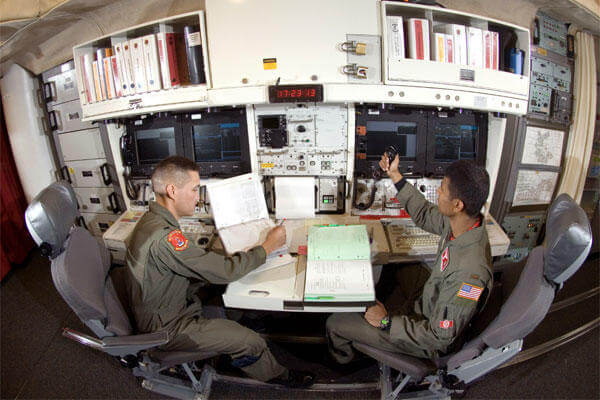The escalating Air Force cheating scandal now involves at least 92 nuclear missile launch officers at Malmstrom Air Force Base, or nearly half of the 190 missileers at the sprawling Montana base, Air Force Secretary Deborah Lee James said Thursday.
The Air Force Office of Special Investigations has determined that "a total of 92 crew members have been identified as having some level of involvement" in cheating on the monthly proficiency test, James said at a Pentagon briefing.
"This situation remains completely unacceptable," James said, "We're going to get to the bottom of this."
James insisted that safety and reliability of the Minuteman III Intercontinental Ballistic Missiles (ICBMs) at Malmstrom were not compromised by the test cheating. However, the 92 officers make up about 20 percent of all nuclear missile officers in the Air Force.
"This was a failure of integrity on the part of certain airmen, and not a failure of the mission," James said.
Of the 92 suspected of cheating, "we're focusing on a core group of about 40" who allegedly texted answers to each other, Wilson said. The others allegedly knew that cheating was going on, but failed to report it.
The OSI cheating probe overlapped with a separate OSI investigation of drug possession allegations involving 11 officers at six Air Force bases in the U.S. and Britain.
James and Gen. Mark Welsh, the Air Force chief of Staff, said earlier this month that the drug investigation turned up evidence leading to the cheating scandal. Two of the officers suspected of drug possession have also been implicated in cheating at Malmstrom.
James said Thursday that the drug possession investigation had also expanded to include at least 13 officers
Earlier this month, Welsh and James said that 34 officers at Malmstrom were suspected of cheating, or knowing about the cheating and failing to report it. The number has since grown as investigatos dig deeper into the cheating ring. Pentagon officials said earlier this week that possibly 60-64 officers were involved.
James said Thursday that the OSI cheating investigation was winding down and she suggested that the 92 officers now implicated would likely be the final total.
James and Air Force Lt. Gen. Stephen Wilson, head of the Global Strike Command, stressed that the cheating thus far appeared to be limited to Malmstrom, and did not involve officers in charge of the Minuteman III missile silos at F.E. Warren Air Force Base, Wyo., or Minot Air Force Base, N.D. – the two other launch bases for ICBMs.
"I'm confident that what we have right now is a Malmstrom incident," James said.
All 92 officers have been temporarily decertified and were no longer on alert, putting a strain on the remaining crews, Wilson said.
The officers still on duty at Malmstrom were pulling additional shifts and were being backed up by staff personnel. Launch officers at Malmstrom had previously been completing eight 24-hour shifts in the silos per month. Since the cheating officers had been suspended, the rest of the crew must complete 10 24-hour shifts per month, said Wilson, who is in charge of 29,000 airmen and the nation's ICBMs and nuclear-capable strategic bombers.
Wilson said the Air Force was also considering bolstering the Malmstrom crews with officers from Warren and Minot, but "I'll tell you right up front there's been no operational impact." At Malmstrom, "the 341st (Missile Wing) continues to meet operational requirements," Wilson said.
Other than the temporary suspensions, no other disciplinary actions have been taken in the cheating scandal as Air Force officials wait for the completion of the investigation. Col. Robert W. Stanley II, who was in charge of the 341st Missile Wing during the cheating, remains in command.
"In the current environment, there is no room for error – ever," said James, who this week completed a tour of Air Force missile and bomber bases to gauge the extent of the problem, and met with groups of launch officers on their concerns.
"I guess I believe now we do have systemic problems in the force," she said.
The systemic problems involved the stress on young officers in handling the responsibility of being in control of the Minuteman missiles, described by Wilson as the most powerful weapons in the world with mulitiple nuclear warheads, or MIRVs (Multiple Independently Targetable Re-entry Vehicles).
James said the young officers told her of a "climate of stress and fear" in the force in which they feel that failing to score 100 percent on the tests will damage their careers and limit chances for promotion.
James said she also was concerned about "the level of micro-management out there" among Air Force leaders that added to the stress.
"We do have systemic problems out there and they have to be addressed holistically," James said. "They didn't cheat to pass, they cheated because they felt driven to get 100 percent." The missileers considered the proficiency tests a "make it or break it" monthly ordeal that would define their careers, James said.
On Wednesday, Defense Secretary Chuck Hagel convened a Pentagon meeting with James and top Air Force officers in the nuclear field to consider recommendations for addressing the emerging problems in the nuclear force.
James said that incentive pay and awards for launch officers were among the proposals on the table, along with Iarger investments in the nuclear force.
James said the questions boiled down to these: "Should we or should we not consider incentive pay? Are we truly putting our money where our mouth is" when it comes improving the nation's strategic deterrence?

























